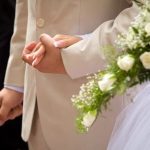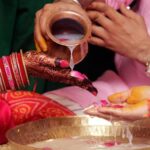What does a officiant say at a wedding? The words spoken by the officiant in a wedding ceremony hold great significance, as they play a crucial role in guiding the couple through their special day. From setting the tone for the ceremony to pronouncing them as married partners, the officiant’s words are filled with love, meaning, and tradition.
In a wedding ceremony, the officiant serves as more than just someone who leads the proceedings – they act as a storyteller, a guide, and a source of wisdom for the couple embarking on this new chapter of their lives. Their words help create a memorable and meaningful experience for both the couple and their guests.
Throughout the ceremony, the officiant’s words are carefully chosen to reflect the love story of the couple, share heartfelt messages of welcome, guide them through exchanging vows and promises, and eventually pronounce them as partners for life. Each word spoken by the officiant holds deep emotional weight and adds to the magic of the wedding day.
The Opening Words
When it comes to the beginning of a wedding ceremony, the opening words spoken by the officiant set the tone for the entire event. These initial phrases not only signify the start of the union between the couple but also serve as a way to welcome guests and create a warm atmosphere. Officiants often use traditional greetings and expressions to kick off the ceremony and engage everyone present.
Here are some common phrases and greetings that officiants typically use at the start of a wedding ceremony:
- “Dearly beloved, we are gathered here today “
- “Friends and family, welcome to this joyous occasion “
- “As we gather in celebration of love and commitment “
These opening words help establish a sense of reverence and significance for what is about to take place. It is a time for everyone to come together in support of the couple and witness their declaration of love and commitment.
As the officiant begins with these introductory words, they also aim to create an inclusive environment where all guests feel welcomed and appreciated. By setting a positive tone from the very start, they help ensure that the rest of the ceremony flows smoothly and joyfully. The opening words spoken by an officiant at a wedding play a crucial role in laying a strong foundation for what is to come – a celebration of love, unity, and lifelong partnership.
Welcome Message
When it comes to officiating a wedding ceremony, one of the crucial moments for the officiant is the welcome message. This part of the ceremony sets the tone for the entire event and is usually one of the first things spoken after the opening words.
The welcome message serves as an introduction to all guests present, creating an atmosphere of warmth and inclusion. It is typically a moment where the officiant acknowledges everyone’s presence and expresses gratitude for sharing in this special day with the couple.
During this part of the ceremony, officiants often speak about the significance of love and unity, emphasizing how a wedding is not just a joining together of two individuals but also a fusion of families and communities. The welcome message can be personalized to reflect the unique qualities and values of the couple getting married.
Officiants may also take this opportunity to highlight any cultural or religious aspects that are important to the couple, ensuring that everyone feels respected and involved in the celebration.
Moreover, welcoming messages spoken by officiants can incorporate quotes, poems, or blessings that encapsulate love, commitment, and hope for the future. These words serve as an invocation of joy and happiness, setting a positive tone for what is to come in the ceremony. Ultimately, the welcome message delivered by an officiant plays a vital role in creating an atmosphere of love, unity, and celebration as two individuals embark on their journey together as spouses.
The Love Story
During a wedding ceremony, one of the most heartwarming moments is when the officiant shares the love story of the couple. This portion of the ceremony allows for guests to gain insight into how the couple met, fell in love, and decided to spend their lives together. The officiant’s words often serve to celebrate the unique journey that brought the couple to this special day, creating an emotional connection with those in attendance.
The recounting of the love story by the officiant not only adds a personal touch to the ceremony but also helps set the tone for the rest of the proceedings. By sharing anecdotes and pivotal moments from the couple’s relationship, the officiant creates a sense of intimacy and nostalgia that resonates with both the couple and their guests. It also serves as a reminder of the love and commitment that have brought everyone together to witness this joyous occasion.
Through sharing stories about how they first met, memorable experiences they shared, and milestones they overcame together, officiants help paint a picture of the couple’s bond and enduring love. This part of the ceremony allows for reflection on what makes their relationship special and reinforces the foundation upon which they are building their future.
The words spoken by the officiant during this segment not only honor the couple’s history but also pave the way for them to embark on their next chapter as newlyweds.
Vows and Promises
Setting the Stage for Vows
As the wedding ceremony reaches the pivotal moment of exchanging vows and promises, the officiant plays a crucial role in guiding the couple through this meaningful part of the event. The officiant typically sets the stage for the vows by highlighting the significance of this commitment, expressing the importance of these promises in building a strong foundation for their marriage. By emphasizing the gravity and beauty of this moment, the officiant helps create an atmosphere of love and solemnity.
The Exchange of Vows
The exchange of vows is a heartfelt moment where couples declare their love and commitment to each other in front of their loved ones. The officiant may lead them through traditional vows or offer guidance on writing their own personal promises.
During this exchange, the couple looks into each other’s eyes, speaking from their hearts as they promise to support each other in sickness and health, for richer or poorer, until death do them part. These vows serve as a public declaration of their love and intention to cherish each other for a lifetime.
Celebrating Promises Made
After the couple has exchanged their vows and promises, the officiant often celebrates this sacred moment by acknowledging the significance of what has just taken place. They may offer words of encouragement and wisdom, reminding the couple that marriage is a journey full of surprises and challenges but also abundant joy and growth. By blessing their union and encouraging them to honor their commitments, the officiant affirms the couple’s love and reinforces the sacredness of marriage.
Ring Exchange
The ring exchange is a significant moment during a wedding ceremony, symbolizing the couple’s commitment and love for each other. During this part of the ceremony, the officiant plays a crucial role in guiding the couple and sharing special words to enhance the symbolism of the rings.
One common phrase that officiants often use during the ring exchange is “With this ring, I thee wed,” which signifies the giving and receiving of the ring as a token of love and devotion. This phrase dates back centuries and is deeply rooted in tradition.
Furthermore, officiants may also say words like “May this ring always remind you of the vows you have taken today,” or “As you wear these rings, may they be a constant reminder of your love and commitment to each other.” These phrases serve to emphasize the permanence and significance of the marriage covenant that the couple is entering into.
The rings themselves act as lasting symbols of their union, and the words spoken by the officiant help to underscore their meaning.
In addition to verbal blessings and well wishes, some officiants may incorporate a symbolic gesture or ritual during the ring exchange, such as a blessing or prayer for the couple’s future together. Whether it’s a religious tradition or a cultural practice, these additional elements can add depth and personalization to this special moment in the ceremony.
Ultimately, through their chosen words and actions during the ring exchange, officiants contribute greatly to creating a memorable and meaningful wedding experience for both the couple and their guests.
| Ring Exchange Phrase | Meaning |
|---|---|
| “With this ring, I thee wed.” | Symbolizes giving and receiving ring as token of love |
| “May this ring always remind you of your vows.” | Emphasizes permanence & significance of marriage covenant |
| Additional Rituals/Prayers | Add depth & personalization to ring exchange moment |
Pronouncement
Symbolic Meaning
When the officiant pronounces the couple as married partners, it is a significant moment in the wedding ceremony. This declaration holds symbolic meaning as it marks the official union of two individuals who have chosen to commit themselves to each other for a lifetime. The words spoken by the officiant during this pronouncement carry weight and importance, signifying not just a legal contract but also an emotional and spiritual bond between the couple.
Cultural Customs
In different cultures and traditions, the pronouncement of the couple as married partners may vary in wording or format. Some officiants may use traditional phrases that have been passed down through generations, while others may opt for more modern or personalized language to reflect the unique relationship of the couple.
Despite these variations, the core essence of this pronouncement remains constant – to affirm and validate the love and commitment shared between two individuals who are embarking on a new chapter of their lives together.
Culmination of Ceremony
The pronouncement serves as the culmination of the wedding ceremony, bringing together all the elements that have been shared throughout the proceedings. It is a moment of joy and celebration for not only the couple but also their families and loved ones witnessing this special occasion.
As the officiant declares them as married partners, there is a sense of unity and solidarity that envelops everyone present, marking a transition from separate individuals to a united partnership. The significance of this pronouncement extends beyond just words spoken; it represents a promise fulfilled and a future embarked upon together as one entity – husband and wife, spouses for life.
Closing Remarks
As the ceremony comes to a close, the officiant plays a crucial role in summarizing the beautiful moments that have unfolded and looking towards the future of the newlyweds. The closing remarks serve as a heartfelt send-off, encapsulating the love and joy that filled the air during the wedding ceremony. It is a time for reflection on the journey of the couple leading up to this special day and anticipation of what lies ahead in their shared life together.
In their closing remarks, officiants often express their best wishes for the couple’s future, encouraging them to cherish and nurture their bond as they embark on this new chapter as spouses. These words are meant to inspire and guide the newlyweds as they navigate through life’s ups and downs, reminding them of the love that brought them together on this significant day.
The officiant may offer words of wisdom, advice, or blessings, reinforcing the commitment made by the couple to each other in front of their loved ones.
Ultimately, as the officiant concludes with their closing remarks, they symbolize not only an authority figure overseeing the union but also a compassionate guide ushering two individuals into a lifetime of partnership. Their words hold power and significance, marking the beginning of a shared journey filled with love, understanding, and unwavering support. It is in these final moments that the officiant’s role truly shines, leaving an imprint on the hearts of all present at this celebration of love.
Frequently Asked Questions
What Does the Officiant Say at a Wedding?
The officiant at a wedding typically introduces themselves, welcomes the guests, and speaks about the significance of marriage. They may also mention the couple’s love story, offer words of wisdom, and lead the couple through their vows and ring exchange.
What Do Officiants Say at Non Religious Weddings?
Officiants at non-religious weddings often focus on celebrating love, commitment, and partnership. They may speak about the unique qualities of the couple’s relationship, share personal anecdotes, or offer readings and poetry that reflect the couple’s values and beliefs. The ceremony is a time to honor the bond between two people.
What Are the Opening Words for the Officiant?
The opening words for an officiant usually set the tone for the ceremony. They might begin by addressing the guests, acknowledging the importance of the occasion, or sharing a meaningful quote or passage. These words often serve to create a sense of anticipation and reverence for what is to come in the wedding ceremony.

I have been involved in marriages for over 20 years helping couples and singles understand more about them.





